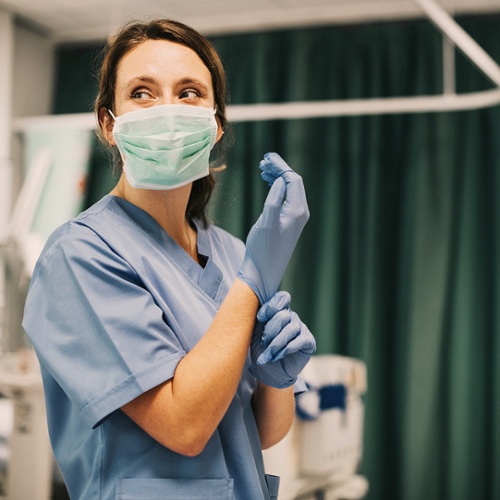If you’re immunocompromised, elderly, pregnant, or otherwise at an increased risk for developing severe COVID-19 symptoms, a COVID-19 diagnosis could severely affect your health. Monoclonal Antibody Treatment is available at Pullman Regional Hospital and hospitals around the country to help manage COVID-19 symptoms for high-risk people. Andrea Howell, Pharmacist at Pullman Regional Hospital, and Dustene Johnston, Director for Pullman Regional Hospital Same-Day Services Department explain how Monoclonal Antibody Treatment works and who is eligible to receive it.
What is Covid-19 monoclonal antibody treatment?
Monoclonal antibodies are laboratory-made proteins that mimic the immune system’s ability to fight off harmful pathogens such as bacteria or viruses. COVID-19 monoclonal antibodies are specifically made to fight off SARS-CoV-2 (COVID-19).
There are two COVID-19 monoclonal antibody treatments authorized by the FDA under an Emergency Use Authorization. These antibodies are indicated to for those who have tested positive with COVID-19 who are at high risk of progressing to severe COVID-19 disease. These antibodies reduce the viral load, and may help avoid hospitalization in patients with a positive COVID-19 diagnosis. The treatment is often given intravenously (IV), but one of them may be given in multiple subcutaneous injections.
How does it work?
When we get sick, our body creates antibodies to fight off infection from the disease-causing organisms. Monoclonal antibody treatments are based on these natural antibodies but scientists create them in the lab and make them into a medication. Once in your system, the COVID-19 monoclonal antibodies target the spike protein that sticks out of the coronavirus and causes COVID-19. When the monoclonal antibodies attach to the spike protein, they can block the virus’s ability to enter the cells, and therefore slow down the infection.
Who is eligible to receive the monoclonal antibody treatment?
Individuals 12 years old or older who have mild to moderate COVID-19 disease and are at high risk for developing severe COVID-19 are eligible to receive COVID-19 monoclonal antibody treatment. Qualifying criteria for being at risk of developing severe COVID-19 disease include the following:
- 65 years of age or older
- Obesity or being overweight (BMI > 25, or BMI>85th percentile for age 12-17)
- Pregnancy
- Chronic kidney disease
- Diabetes
- Weakened Immune system
- Currently on immunosuppressant medication
- Cardiovascular disease
- Chronic lung disease
- Sickle cell disease
- Neurodevelopmental disorders
- Dependent on Medical Technology such as a feeding tube
It’s important to note that if the patient has already progressed into severe disease (meaning supplemental oxygen is needed, patient cannot maintain oxygen levels greater than 93%, or patient requires hospitalization) they do not qualify for the treatment.
When should someone receive the treatment?
The treatment should be administered as early in the disease course as possible and not later than 10 days after diagnosis of COVID-19. Because the treatment is intended to prevent progression of the disease, patients should get it early in their diagnosis, even if they are not feeling too bad yet. The treatment is administered through an IV over 30 minutes. The patient then remains for an additional 60 minutes for monitoring of potential reactions. In total, the patient is at the hospital for approximately 2-2.5 hours total.
Is a provider order required for treatment?
Yes, a provider order for monoclonal antibodies is necessary. Please contact your primary care physician if you test positive for COVID-19 and wish to receive monoclonal antibody treatment. Your primary care physician can help decide if monoclonal treatment is right for you. The treatment is available Monday through Friday, each afternoon at Pullman Regional Hospital.
While Monoclonal antibody treatments can help manage symptoms, they do not decrease COVID-19 quarantine or isolation requirements. Please follow all recommendations from the CDC, Health Department, and your primary provider pertaining to quarantine. Additionally, the CDC recommends that patients do not receive their COVID-19 vaccination for 90 days after the monoclonal antibody treatment, even if they have already received their first dose of Pfizer or Moderna.
As always, prevention is the best way to avoid COVID-19: wear a mask, socially distance, and get the coronavirus vaccine. Schedule your vaccine at one of Whitman County’s vaccine clinics.
